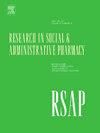Why are pharmacy technicians leaving? Factors contributing to turnover intention and strategies for retention
IF 3.7
3区 医学
Q1 PUBLIC, ENVIRONMENTAL & OCCUPATIONAL HEALTH
Research in Social & Administrative Pharmacy
Pub Date : 2025-02-01
DOI:10.1016/j.sapharm.2024.10.010
引用次数: 0
Abstract
Background
Pharmacy technicians play a crucial role in the healthcare system to enable pharmacists to focus on clinical services. However, a lack of recognition for their role and contribution leads to high turnover rates.
Objective
To identify the reasons behind pharmacy technicians leaving, or intending to leave, pharmacy practice.
Methods
This study used a mixed methods approach, incorporating an online survey (n = 11,762; response n = 603, 5.2 % response rate) and semi-structured interviews (n = 19) with pharmacy technicians in England. The survey was designed based on instruments used previously to explore pharmacy professionals’ career commitment, organisational commitment, job satisfaction, job stress and intention to leave. Open-ended survey texts (n = 24,410 words) were analysed using Leximancer, a text-mining software application. The interviews offered qualitative insights into the views and experiences of pharmacy technicians and the factors that contribute to their intention to leave practice.
Results
Career advancement opportunities for pharmacy technicians are limited, especially when compared to pharmacists in leadership positions. Organisational commitment has an impact on individual career commitment. We found significant associations between the sector pharmacy technicians work in and their intention to remain working with their current employer for two or more years, with those in general practice were most likely to remain working at their current place of employment for at least two years (N = 85,91 %) and those in community pharmacies were least likely (N = 87,71 %). Respondents were most likely to be satisfied with freedom to choose working methods (72 %) and least likely to be satisfied with the opportunity for promotion/career advancement (38 %).
Conclusion
The phenomenon of ‘occupational regret’, where negative emotions prompt employees to leave their chosen career, must be acknowledged and addressed to ensure retention. Ensuring clear role definitions, equitable remuneration, and career progression opportunities for pharmacy technicians is vital for their retention and, ultimately, the quality of patient care.
药房技术人员为何离职?导致离职意向的因素和挽留策略。
背景:药房技师在医疗保健系统中发挥着重要作用,使药剂师能够专注于临床服务。然而,由于对他们的作用和贡献缺乏认可,导致他们的离职率居高不下:确定药学技术人员离开或打算离开药学行业的原因:本研究采用了混合方法,包括在线调查(n = 11762;回复 n = 603,回复率为 5.2%)和对英格兰药房技术人员的半结构式访谈(n = 19)。调查的设计基于之前用于探究药学专业人员的职业承诺、组织承诺、工作满意度、工作压力和离职意向的工具。我们使用文本挖掘软件 Leximancer 对开放式调查文本(n = 24,410 字)进行了分析。通过访谈,对药房技术人员的观点和经验以及导致其离职意向的因素进行了定性分析:结果:药房技术人员的职业发展机会有限,尤其是与担任领导职务的药剂师相比。组织承诺对个人职业承诺有影响。我们发现,药学技术人员所从事的行业与他们是否打算继续在当前雇主处工作两年或两年以上之间存在着明显的关联,其中在全科诊所工作的药学技术人员最有可能继续在当前工作地点工作至少两年(N = 85.91 %),而在社区药房工作的药学技术人员则最不可能(N = 87.71 %)。受访者最可能对自由选择工作方式感到满意(72 %),最不可能对晋升/职业发展机会感到满意(38 %):必须承认并解决 "职业遗憾 "现象,即负面情绪促使员工离开自己选择的职业,以确保留住员工。确保药房技术人员有明确的角色定位、公平的薪酬和职业发展机会,对留住他们并最终提高患者护理质量至关重要。
本文章由计算机程序翻译,如有差异,请以英文原文为准。
求助全文
约1分钟内获得全文
求助全文
来源期刊

Research in Social & Administrative Pharmacy
PUBLIC, ENVIRONMENTAL & OCCUPATIONAL HEALTH-
CiteScore
7.20
自引率
10.30%
发文量
225
审稿时长
47 days
期刊介绍:
Research in Social and Administrative Pharmacy (RSAP) is a quarterly publication featuring original scientific reports and comprehensive review articles in the social and administrative pharmaceutical sciences. Topics of interest include outcomes evaluation of products, programs, or services; pharmacoepidemiology; medication adherence; direct-to-consumer advertising of prescription medications; disease state management; health systems reform; drug marketing; medication distribution systems such as e-prescribing; web-based pharmaceutical/medical services; drug commerce and re-importation; and health professions workforce issues.
 求助内容:
求助内容: 应助结果提醒方式:
应助结果提醒方式:


